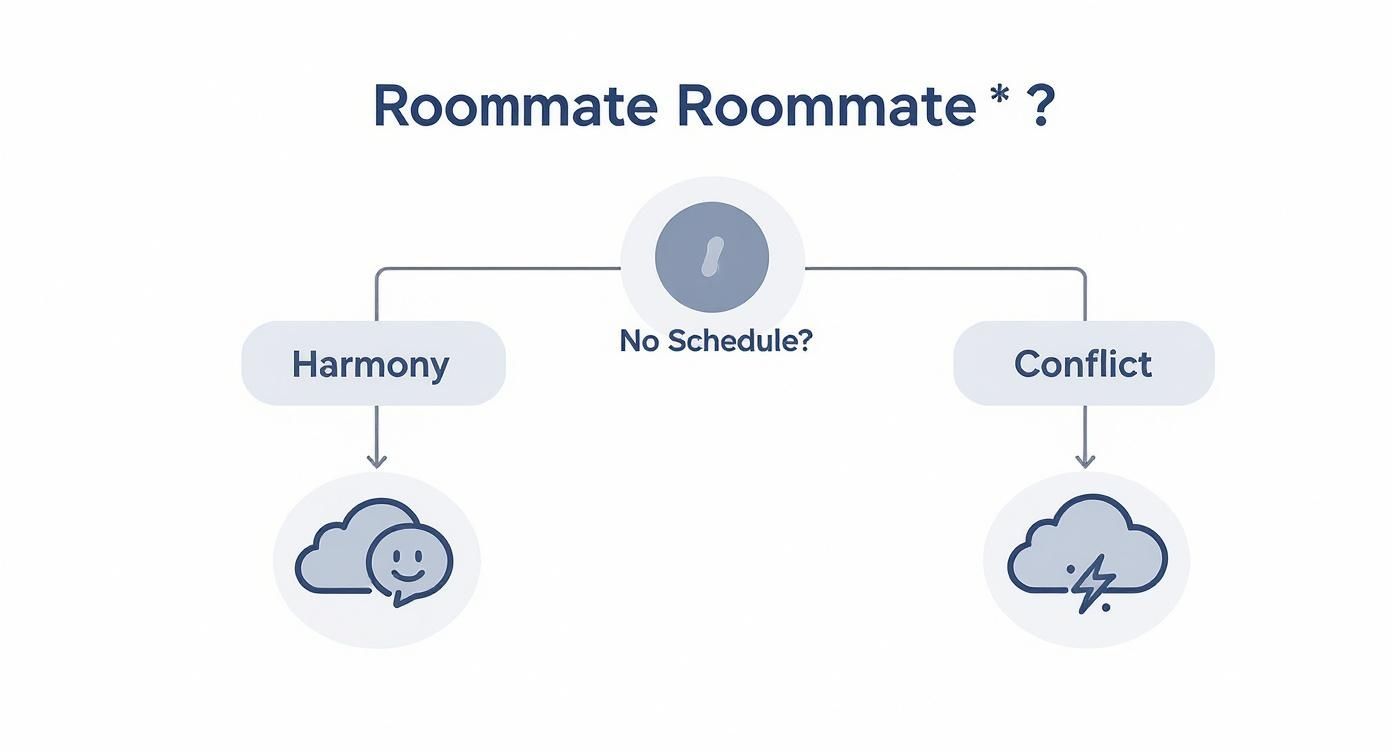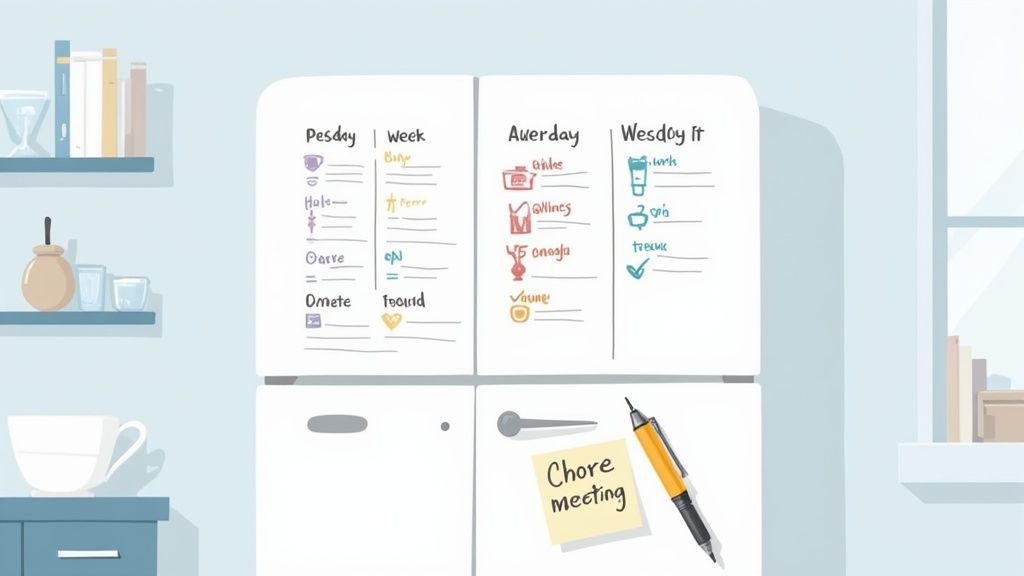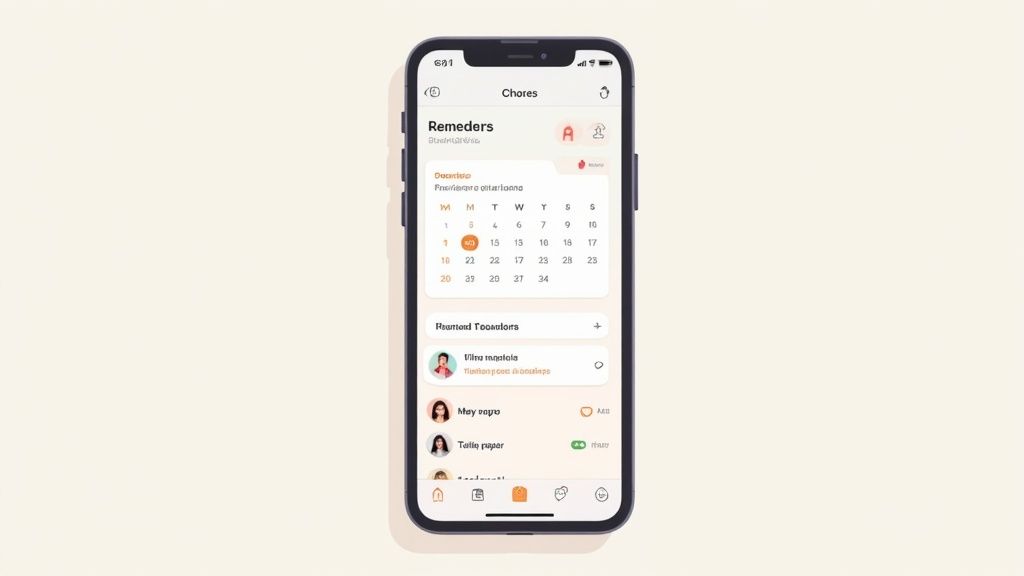A solid roommate cleaning schedule template isn't just some chore chart you tape to the fridge; it's your blueprint for a peaceful home. It’s what turns unspoken, and often mismatched, expectations into a clear, fair plan everyone can agree on. This simple tool is often the only thing standing between a happy home and a passive-aggressive war zone.
Why a Cleaning Schedule Is Your Secret Weapon for Roommate Harmony
Let's be honest: living with people is a constant negotiation of different habits and personal standards of "clean." Without a game plan, it’s ridiculously easy for resentment to start brewing under the surface. One person feels like they’re the only one who ever wipes down the counters, while another is constantly wondering why the trash can looks like a science experiment.
These little annoyances are like weeds. Left unchecked, they can completely take over, strangling a good friendship and turning your home into a place you want to avoid.
A cleaning schedule isn't about being controlling or micromanaging your roommates. Think of it as a tool for fairness and mutual respect. It’s the simplest way to make sure the work of keeping your shared space livable is split evenly, so no one feels like they’re pulling all the weight.
Shifting from Annoying Assumptions to Clear Agreements
The real problem behind most roommate cleaning fights isn't that someone is lazy, it's that everyone is operating on assumptions. We all walk around thinking our definition of "clean" is the universal standard, and that’s where the classic arguments start:
- The Overflowing Trash Can: Who finally cracks and takes it out? Is it the person who put the last thing in, or the person who sees it first?
- The Never-Ending Dish Pile: How many days can a dirty dish "soak" in the sink before it becomes a permanent resident?
- The Mysterious Bathroom Grime: When was the shower actually scrubbed last? Who is responsible for tackling the soap scum?
Ambiguity is where these problems thrive. A schedule kills that ambiguity. You replace vague assumptions with clear, actionable agreements. Everyone knows what their job is and when it needs to be done, which builds a real sense of teamwork and shared ownership of the space. This became a make-or-break issue when everyone started spending a lot more time at home.
The Real-World Impact on Your Household
Recent years have really put a spotlight on how much a clean, shared space matters for our sanity. During the COVID-19 pandemic, cleaning habits shot to the top of the list for roommate tension. A 2021 survey showed that in households where roommates barely interacted, only 59.2% were satisfied with their living situation. It’s clear that not being on the same page about shared duties tanks everyone's happiness.
Interestingly, the problem got slightly worse in bigger households. 6.1% of renters with three or more roommates reported being extremely dissatisfied, compared to just 3.7% of those with only two. You can dive deeper into how renters managed these relationships over at Rent.com.
A great roommate cleaning schedule is less about scrubbing floors and more about building respect. When everyone contributes, the focus shifts from individual messes to a shared sense of pride in your home. It’s a proactive step that protects both your living space and your relationships.
Finding the Right Cleaning System for Your Household
Let's be honest: choosing a roommate cleaning schedule isn't a one-size-fits-all deal. The system that works perfectly for a two-person apartment can quickly turn into a source of chaos in a house of four. The real secret is finding a model that clicks with your group’s unique mix of schedules, personalities, and, yes, different ideas of what "clean" actually means.
Before you just grab a generic chart off the internet and tape it to the fridge, it’s worth understanding the two main ways people tackle this. Each one takes a different approach to splitting up the work and keeping everyone on track. Getting this part right from the beginning is the single best thing you can do to create a plan that actually sticks.
The Two Core Cleaning Models
First up is the classic task-based rotation system. This is pretty straightforward: everyone takes turns doing each chore on the list. One week, you might be on bathroom duty. The next, you're vacuuming the living room. The week after that, you're the master of the kitchen.
This approach is fantastic for making sure everyone learns how to handle every job around the house, which stops one person from becoming the designated "expert" on a gross chore nobody else wants to touch. It also feels incredibly fair, since the less-than-glamorous jobs get passed around equally over time.
The other popular method is the zone-based system. With this model, each roommate basically "owns" a specific part of the home. One person might be permanently in charge of the kitchen, another handles the living room, and a third is responsible for keeping the shared bathroom from becoming a science experiment.
This system really shines when roommates have different strengths or even preferences. If one person genuinely gets satisfaction from a spotless kitchen and another is a pro at keeping the living room tidy, assigning zones just makes sense. And remember, a good system isn't just about scrubbing; it's also about keeping things orderly, like knowing how to organize your laundry room so it doesn't become a nightmare.
This flowchart breaks down how a little bit of planning can be the difference between a peaceful home and an all-out war over who left crumbs on the counter.

As you can see, the fastest path to conflict is having no plan at all. Finding the right system, on the other hand, is your direct route to a much happier living situation.
Comparing Roommate Cleaning Schedule Models
So, which one is right for you? To help you decide, I've put together a quick comparison of the most common systems. Think about your specific household dynamics as you look through the pros and cons of each.
| Schedule Model | Best For | Pros | Cons |
|---|---|---|---|
| Task-Based Rotation | Households that value absolute fairness and variety in chores. Ideal for 2-3 roommates with similar schedules. | Ensures no one gets stuck with the "worst" chore forever. Everyone learns every task. | Can be tricky to track who did what and when. A roommate might slack on a chore they hate, knowing it's someone else's problem next week. |
| Zone-Based Cleaning | Larger households (3+ roommates) or those with very different schedules and cleaning preferences. | Crystal clear ownership and accountability. Lets people focus on areas they don't mind cleaning. | Can cause resentment if one zone is seen as way more work than another. One person's lower standard of "clean" becomes a permanent issue for that area. |
| Hybrid System | Flexible households that want the best of both worlds. Great for roommates who are willing to compromise. | Combines the fairness of rotation (for big weekly/monthly tasks) with the consistency of zones (for daily tidying). | Needs more upfront communication to define which tasks are rotated and which are zoned. |
At the end of the day, no single system is perfect for everyone. This table is a starting point, but the best approach is always the one you all agree on and actually commit to following.
The most effective system is the one your household collectively agrees on and commits to. A "perfect" roommate cleaning schedule template on paper is useless if no one is motivated to follow it.
Ultimately, your most powerful tool here is open communication. Talk about these options, weigh the pros and cons for your specific living situation, and don't be afraid to try something out for a month and then adjust. For more great ways to keep your shared spaces tidy, check out our guide on apartment organization ideas. The goal is to find a sustainable rhythm that keeps your home clean and your friendships intact.
How to Build and Launch Your Cleaning Schedule
Alright, you've got the strategy. Now it's time to turn those ideas into a living, breathing cleaning schedule that actually works. Moving from planning to action is about more than just filling out a grid; it’s about creating a shared agreement that everyone genuinely buys into. This is where the abstract concept of "clean" becomes a concrete plan.
The first step? You can't assign tasks if you don't know what they are. You and your roommates need to create a master list of every single chore required to keep the place from descending into chaos. Think of it as a complete inventory of your home's cleaning needs.

Create a Master Chore List
Grab a notebook and walk through each shared space together. This isn't the time to point fingers at old messes; it's a neutral, fact-finding mission. The more specific you are now, the fewer arguments you'll have later.
Break your list down by how often things need to get done. This keeps the schedule from feeling overwhelming.
- Daily Chores: These are the small, constant tasks that prevent disaster. Things like wiping kitchen counters after cooking, washing your own dishes (or at least getting them in the dishwasher), and taking out the trash when it’s overflowing.
- Weekly Chores: This is the real reset button for the apartment. Think vacuuming the living room, scrubbing the entire bathroom (toilet, shower, sink), mopping floors, and wiping down the gross stuff on the microwave.
- Monthly Chores: These are the deep-cleaning jobs everyone forgets but that make a huge difference. We're talking about cleaning out the science experiments in the fridge, dusting blinds and baseboards, or tackling the inside of the oven.
Getting this granular eliminates any gray area. "Clean the kitchen" is a recipe for conflict. "Wipe counters, clean stovetop, and sweep floor" is a clear directive no one can misinterpret.
Assign Tasks and Choose Your Template
With your master list complete, it’s time for the fun part: assigning the chores. Using one of the models we talked about earlier (like rotating tasks or owning zones), start plugging everything into a schedule. The absolute key here is making sure it feels fair. Balance the workload by considering both the time and the sheer annoyance factor of each task.
One popular template found success by having roommates switch tasks every 15 days. This simple rotation dramatically cut down on conflicts because no one got stuck with a hated chore for too long. Their system also had a simple checkmark system to track what was done, which you can see in their roommate chore chart guide.
To get you started right now, we've got a few printable templates ready to go:
- Simple Grid Template: Perfect for a classic, at-a-glance weekly overview.
- Weekly Checklist Template: A more task-focused format for that satisfying feeling of checking things off.
- Monthly Calendar Template: Ideal for slotting in those bigger, less frequent deep-cleaning jobs.
The most critical step in this entire process is getting buy-in from everyone. A schedule that is forced on people, rather than agreed upon, is doomed from the start.
Hold a 'Chore Meeting' to Finalize the Plan
Before you post anything on the fridge, call a "chore meeting." This shouldn't be a stuffy, corporate-style sit-down. Order a pizza, make it casual, and turn it into a discussion. The goal is to review the master list and the proposed schedule as a team.
This is where you iron out the kinks. You might find out that one roommate genuinely doesn’t mind scrubbing the bathroom but has a deep, philosophical hatred of doing dishes. Another might have a chaotic work schedule that makes it impossible to do their weekly task on a Tuesday. You only learn these things by talking.
Listen to feedback. Be ready to compromise. Tweak the plan until you have a final version of your roommate cleaning schedule that everyone can honestly get behind. This collaborative launch is what turns a piece of paper into a powerful tool for a peaceful home.
Keeping the Peace When Conflicts Arise
Having a shiny new cleaning schedule is a great first step, but let's be real: the real test comes when life gets in the way. It’s inevitable. Someone is going to forget to take out the trash or have a brutal week at work and completely skip their turn cleaning the bathroom. This is where your schedule proves its worth, not as a rulebook, but as a guide for navigating these bumps without letting them explode into household drama.
The key is to lean into communication and flexibility, not rigid enforcement. Nobody wants to live with a "chore cop" monitoring their every move. The point isn't to assign blame; it's to have a framework for solving problems like adults.
Addressing Missed Chores Without the Drama
When a roommate consistently drops the ball on their chores, it’s so easy to let frustration build until it leaks out in a passive-aggressive note left on the counter. A much better approach is to have a calm, direct conversation. Whatever you do, avoid accusatory language like, "You never clean the bathroom." It just puts people on the defensive.
Instead, try using "I" statements that focus on the shared goal of a livable space. Something like, "Hey, I noticed the bathroom didn't get cleaned this week, and I'm feeling a bit stressed with the mess. Is everything okay?" This opens the door for a real conversation, not an argument.
More often than not, there’s a simple reason for the slip-up. Your roommate might be swamped with a project or dealing with personal stress. By approaching them with a little empathy, you create an opportunity to find a solution that works for everyone.
The most successful cleaning schedules have built-in flexibility. A simple rule allowing roommates to swap chores when they have a busy week can prevent 90% of potential conflicts before they even start.
Handling Different Standards of Cleanliness
One of the biggest sources of roommate friction is the "definition of clean" debate. Your idea of a wiped-down counter might be a quick swipe with a damp sponge, while your roommate expects a disinfected, crumb-free surface. This is exactly why getting super specific during your initial "chore meeting" is so critical.
If you find that your standards still aren't aligning, it's time for a friendly check-in. Don't let resentment fester. Just schedule a quick follow-up meeting to recalibrate everyone's expectations.
You can use this time to:
- Review the Chore List: Quickly go over the definitions for each task again. Is "clean the kitchen" clear enough, or does it need to specify wiping down appliances?
- Offer a Quick Demo: Sometimes it’s easier to show, not tell. A simple, "Hey, this is what I mean by scrubbing the stovetop," can clear up any confusion in seconds.
- Agree on the "Big Three": Identify the top 1-2 things that are most important to each person. Maybe you can’t stand a dirty bathroom, and your roommate hates a full sink. This helps everyone prioritize what truly matters for keeping the peace.
Remember, keeping your apartment clean isn't just about making it look nice; it has real financial implications. Consistently neglecting deep cleaning can lead to permanent stains, mildew, or damage that you'll pay for later. Learning how to protect your security deposit is a powerful motivator for everyone to stick to the plan and keep the property in good shape.
Using Digital Tools to Manage Your Chores
While a paper chart on the fridge has its classic, old-school charm, moving your roommate cleaning schedule template into the digital world can make life so much easier. Technology gives you some powerful ways to automate reminders, track who’s done what, and keep everyone on the same page without having to be the bad guy.

Think of these tools as a neutral, third-party assistant for your household. They handle the nagging so you don't have to, making sure chores don't fall through the cracks during a hectic week.
Shared Calendars and Dedicated Apps
The easiest place to start is a shared digital calendar like Google Calendar. You can create recurring events for each weekly chore, like "Clean Bathroom" or "Take Out Trash," and assign them to a specific roommate. The automated notifications work like gentle, impersonal nudges that it's their turn to pitch in.
Beyond that, a lot of people find success with top planning apps built to organize different parts of life. But dedicated chore-sharing apps take it a step further, with features designed specifically for roommates:
- Task Tracking: Check off completed chores so everyone can see what's done. No more "I thought you were doing that."
- Notifications: Send automatic pings when a task is due or overdue.
- Rotations: Some apps can even automatically rotate chores among roommates, so the schedule always feels fair.
This digital approach works great alongside a physical chart. The chart on the fridge is a constant visual reminder, while the app ensures tasks stay top-of-mind even when you're out and about.
Managing Shared Supplies and Expenses
Let’s be honest, one of the most common roommate arguments is over shared supplies. Who bought the last roll of paper towels? Is it your turn to grab dish soap? Digital tools can finally put these debates to rest.
Using a simple shared inventory or expense-tracking app completely changes how you manage communal goods. These apps let you create a list of shared items, tracking who bought what and when. This transparency removes all the guesswork and simmering resentment about who’s pulling their weight.
With multi-user access to a shared inventory, everyone can see what's running low and whose turn it is to restock. Problem solved.
Using technology for chore management isn't about replacing communication; it's about supporting it. These tools remove the friction from daily logistics, freeing you up to have more positive interactions with your roommates.
This kind of structured household management is becoming more common. In the United States, about 10% of all households hired professional cleaning services last year, a number that's only expected to grow. This just shows how much busy schedules impact keeping a home clean, making a clear system essential for roommates who are managing it all themselves.
Common Questions About Roommate Cleaning Schedules
Even a perfectly planned cleaning schedule will eventually crash into the messy reality of life. Someone’s definition of “clean” won’t match yours, an unexpected vacation will throw a wrench in the rotation, or you’ll find that the system you all agreed on just isn’t being used.
Don’t worry, this is normal. Here are some quick, no-nonsense answers to the most common snags roommates run into after putting their cleaning plan on paper.
What If My Roommate and I Have Different Definitions of Clean?
This is the classic roommate conflict, and it almost always comes down to one thing: vagueness. The solution is to get ridiculously specific before it ever becomes a fight.
Vague tasks are a recipe for resentment. "Clean the kitchen" can mean a quick wipe-down to one person and a deep scrub to another. Your schedule needs to eliminate that gray area completely.
Instead, break it down into concrete, non-negotiable actions. For example:
- Wipe down all countertops with spray cleaner
- Clean the stovetop and knobs
- Sweep the floor and mop up any spills
- Empty the dishwasher and put dishes away
When you define the exact outcome for each chore, you create a shared standard. It's not about feelings or opinions anymore; it's about checking off a list everyone agreed to.
The best cleaning schedules leave zero room for interpretation. Think of a detailed checklist as your household's official definition of 'clean.' It prevents arguments by setting clear, objective expectations from day one.
How Do We Handle Chores When Someone Is on Vacation?
Life happens, and vacations shouldn’t cause tension at home. The key is having a fair, pre-agreed policy so there’s no guesswork or resentment when someone books a trip.
Here are a couple of solid, fair-minded approaches that work for most households:
- Clean Before You Go: The simplest option. The roommate heading out of town completes their assigned weekly tasks right before they leave. The house is clean, their duties are done, and everyone is happy.
- Arrange a Swap: They can ask another roommate to cover their shift while they're away, promising to return the favor by taking that person's week later on.
For longer trips (more than a week), you might agree as a group to just absorb their duties until they return. Whatever you decide, hash it out during your initial house meeting. That way, everyone knows the protocol long before a plane ticket is even purchased.
Are Digital Apps Better Than a Physical Chore Chart?
Honestly, neither one is universally "better." The best system is simply the one your household will actually stick with. Each has its own strengths.
A physical roommate cleaning schedule template stuck on the fridge is surprisingly powerful. It’s a constant visual reminder that’s impossible to ignore every time you grab a snack. It keeps accountability front and center.
On the other hand, digital apps are fantastic for sending notifications, which is a lifesaver for roommates with crazy schedules. They’re great for tracking who did what and sending those gentle, automated nudges. Many people find a hybrid approach is the sweet spot: use a physical chart for high visibility and a shared calendar or app for the reminders.
A clear plan is the foundation of a happy home, but managing shared items and supplies is just as important. Vorby helps you create a shared digital inventory, so you always know whose turn it is to buy paper towels or cleaning spray. See how it works at https://vorby.com.



